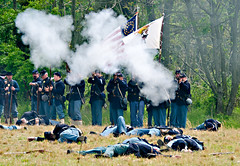Imagine engaging in an intellectual discussion with another person over a controversial issue. Passions flare and the discussion increases in volume and intensity. You and the other individual begin to angrily shout down one another over this issue, leading to a physical altercation in which the other individual—stronger and larger than you are—beats you into near-unconsciousness. You surrender of necessity. The other individual, gleefully boasting in his domination over you, victoriously proclaims himself the champion, and his opinion of the original issue the correct one.
This ridiculous conclusion—that violence can authoritatively and conclusively settle an intellectual question—is unfortunately not found only among short-tempered thugs. It is quite common in the world of politics.
In perhaps no other circumstance is this argument more glaringly evident than in regards to the so-called “Civil War.” A recent example is provided courtesy of the thankfully-former Senator Bob Bennett of Utah. Bennett has been given a weekly column in the Deseret News, in which he has adopted a grandfatherly tone ("intrinsically paternalistic," Matt Damon might say), addressing his readers with the same dry, superior style he mastered during his time in the Senate.
In a recent article titled “The Civil War’s lesson on secession,” Bennett discusses why the victory of the North against the South and their successful use of extreme violence and bloodshed has provided future Americans a conclusive, definitive position on the underlying intellectual question.
Tangentially, I should point out one of the article’s glaring falsehoods, namely, his assertion that the war “was caused by slavery.” In Bennett’s defense he cites an old college professor who claimed that Lincoln himself said the war was about slavery, and that therefore that had to be the case, without question. Unfortunately that’s hardly accurate. Lincoln repeatedly affirmed that the war was not about slavery at all. In his first inaugural address he stated that “I have no purpose, directly or indirectly, to interfere with the institution of slavery in the States where it exists. I believe I have no lawful right to do so, and I have no inclination to do so.” As clear as that can be, he explained in a bit more detail in a previous debate with Stephen Douglas:
I will say, then, that I am not, nor ever have been, in favor of bringing about in anyway the social and political equality of the white and black races — that I am not, nor ever have been, in favor of making voters or jurors of Negroes, nor of qualifying them to hold office, nor to intermarry with white people; and I will say in addition to this that there is a physical difference between the white and black races which I believe will forever forbid the two races living together on terms of social and political equality. And inasmuch as they cannot so live, while they do remain together there must be the position of superior and inferior, and I as much as any other man am in favor of having the superior position assigned to the white race.
Sorry, Mr. Bennett. Your history teacher was wrong.
Returning to the overall question of whether might makes right, or more correctly, whether the intellectual position of a victor in battle is automatically validated and proven correct, Bennett writes (after a hard-to-follow chain of statements) that the issue of secession “has been settled.” So, not only do the victors of war claim that their position has been sufficiently settled, but those who agree with them point in perpetuity to the aggressive acts of the past in support of their own position at present.
This is like saying that a bully who calls his male victim a girl is in fact correct, simply because he beat the kid up. One cannot legitimately provide a convincing and factual conclusion to an argument by pulling out a weapon.
Secession was and remains an intellectual, political question with a complex background and implications. The debate surrounding its past, present, and future is passionate and at times persuasive. And despite the bullies who claim that the debate is “settled,” it will continue to be a valid point of discussion as liberty-minded, sovereign Americans determine how best to “alter or to abolish [their government], and to institute new Government, laying its foundation on such principles and organizing its powers in such form, as to them shall seem most likely to effect their Safety and Happiness.”
***************
Related Posts (automatically generated)
Continue reading at the original source →




